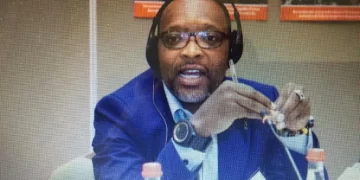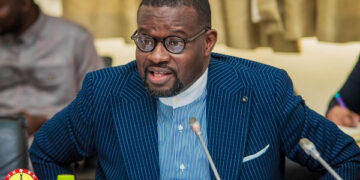Yonny Kulendi, a Justice of the Supreme Court, has confirmed that the public can criticize judges in Ghana, but that criticism should be constructive.
On Wednesday, March 3, he said this in a joint press conference with the Ghana Journalists Association, the National Media Committee, and the Ghana Bar Association.
“When the judges talk, that is the end of our roles; it is not in our position to go into studios, debates, or commentaries; that responsibility falls to you [Media]…be let’s constructive; we accept criticism. Criticize us as harshly as you like, but don’t disrespect us for the love of God.
“Don’t chastise us, don’t talk ill of us, and don’t call us names.”
He continued, “You’ll have to take this part of the work seriously. It’s just as important as the role you’ve played in broadcasting the proceedings around the world, because the Ghanaian people own the process at the end of the day.
“It’s critical that they understand what happened, and that when the judges talk, the referee blows the whistle, and the lots fall where they fall, regardless of our interests, likes, and dislikes. So, let’s be proactive, let’s be constructive,” he said.
His remarks came after the judges were chastised for asking media organizations to delete reports that depicted justices of Ghana’s highest court in a negative light.
Lawyers from Ghana’s Legal Service, Sory@Law, issued the order on behalf of the Court.
They say that some media reports include “a series of incendiary, hateful, and insulting comments and speeches…against the Justices.”
The order was called “scandalous” by the Ghana Journalists Association (GJA).
“The GJA is, to put it mildly, dumbstruck in reading this obnoxious directive pregnant with sinister threats to media freedom in Ghana, which is touted as a land of freedom and justice,” President of the GJA Affail Monney said at a press conference in Accra on Monday March 1. This is scandalous, with all due respect.”
“Unsurprisingly, our phones have been overwhelmed with calls from journalists, media watch organizations, and defenders of press freedom and free speech from all over the world, all wanting to know what was going on after the Judicial Service made that controversial comment. “It is widely accepted that media rights are not absolute, but eligible. And legal experts teach us that such credentials must be in compliance with the law, obey due process, and be used to achieve valid goals and objectives. The GJA believes that the Judicial Service should have avoided any perception or circumstance that has the potential to instill fear and encourage a culture of silence, which Ghana was embroiled in during the time of autocratic misrule, in drafting the scandalous comment. They believe that criticism is a gift that all branches of government require. Denying the judiciary the gift would be a miscarriage of justice. ‘The bare reality is better than a well-dressed lie,’ said Ann Landers. In this sense, the plain truth is that the judiciary is not immune to criticism. However, critique must be presented in a way that does not jeopardize the administration of justice.
To that end, the GJA encourages the media to remain cool and not be seduced into scandalizing the court with irrational statements or verbal stones, no matter how inflammatory the Judicial Service’s statement might be.”
Read Also: The Audit Service Board’s attitude towards Domelevo, absurd and unfortunate – CDD
SOURCE: ATLFMNEWSONLINE



























